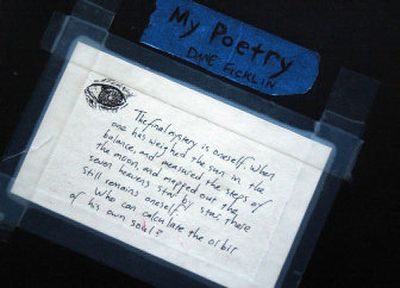Feeling his curse

Dane Ficklin, 17, who will be a senior at Central Valley High School, is an impulsive writer. A poet and author, he’s regularly hit by the urge to jot down words. If he does not have writing utensils on hand, a receipt and pencil stub will suffice.
From a piece titled “Poets & Fate,” he portrays the main character as he would describe himself: “There was no mirth present in his eyes now, however. He was writing a poem. When he wrote, nothing existed but himself and his pen and paper. He might be writing in the midst of the furies of the Battle of Armageddon, and notice only that the air he breathed contained a bit more smoke and dust than he cared for. But still he would write on.”
“Writing is an escape of sorts,” says Ficklin, “people who don’t write don’t understand. I need to write.”
Most kids his age are not deep thinkers. “Kids are mostly confused,” he says, “I pretend not to be. I have a different way of venting. Writing helps immensely.”
From his collection called “Excerpts from the Journal of an American Soldier,” he expresses that idea: “It is only because I am writing last night’s events down now and venting my emotions that I am able to retain my sanity, for without reflection there can be no redemption.”
From poems to short stories to novels in the making, his work reflects that of a much older person.
He writes of war as if he knows it: “War will either make corpses or demons of us all … We may resist it, but in the end the shock is too violent and we are forced to take sides … In the end, all social problems shape themselves around that maw … .”And he writes of love as if he were familiar with it: “Love. All the world’s joy and happiness and pain expressed in so simple and short a word. The infinite expression of an infinite ideal bound to such a limited and bare syllable.”
He is old-fashioned. He often writes with a quill and ink, and even owns a wax stamp. He believes in chivalry and modesty.
A devout Mormon, he began reading the Bible at the age of 2, and by the third grade, he was reading Michael Crichton. In second grade, he wrote his first poem and his teacher kept it. Chrisy Riddle, a creative writing teacher at CV, says, “He is eloquent, creative and talented. I wouldn’t be surprised if he were to complete a novel within a couple of years.”
One such nove lis in the works. “The Door” is more laid-back then his other writing. It is not as serious, but scary and quite humorous. As Alex, the main character, grapples with a ghost, he says to himself, “I hadn’t been defiling anything! I may have if I’d been allowed to wet myself, but that would have been purely unintentional.”
After Ficklin graduates from high school, he plans to attend college for a year and then go on a two-year mission. His writing will follow him.
At times he calls his need to write a curse. From his poem, “The Poet’s Curse”: “For what does one do when there are no words/To describe what one feels inside?
A jumble of feelings that prick like burrs/Exhausting your ravaged mind.”
The written word is a beautiful and powerful thing. Hopefully, like chivalry and modesty, it will not be lost.